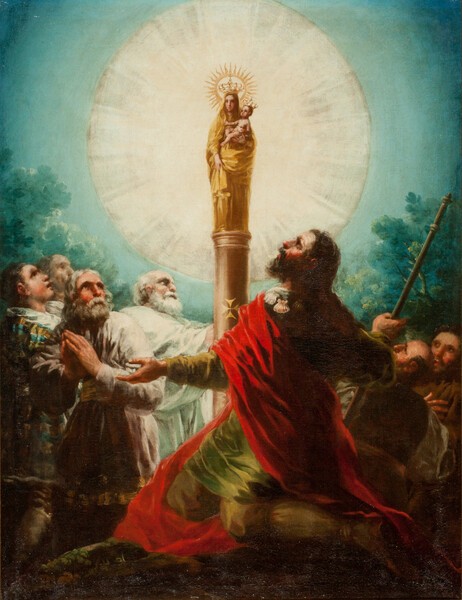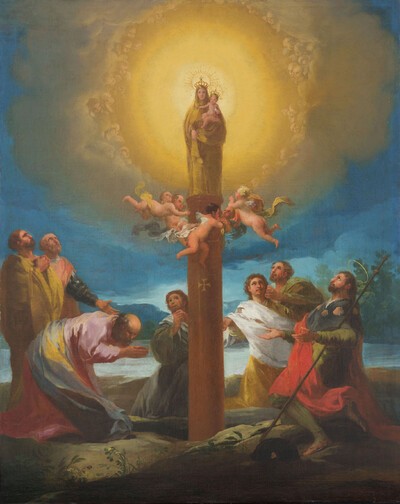- Cronología
- Ca. 1775
- Ubicación
- Private collection, Madrid, Spain
- Dimensiones
- 80 x 107 cm
- Técnica y soporte
- Oil on canvas
- Reconocimiento de la autoría de Goya
- Attributed work
- Titular
- Private collection
- Ficha: realización/revisión
- 24 Aug 2022 / 08 Jun 2023
- Inventario
- 225
Work made known by the Marquis of Lozoya in 1951, when it belonged to the Rosillo collection in Madrid. It was offered for sale by the CAylus Gallery at the Maastrich antiques fair in 2011, at 4.5 million euros, although under the condition that it remain in Spain because it had been declared nonexportable, did not find a purchaser. Between 2013 and 2018 it was deposited in the Museum of Zaragoza on loan. It was again auctioned at the Alcalá Gallery in Madrid (June 23, 2022), with a starting price of 2 million euros, with no success.
The painting represents an episode that Marian tradition places in the year 40 A.D. Santiago el Mayor and his disciples were in the city of Zaragoza when, on the bank of the Ebro river, they heard the voices of angels singing Ave María gratia plena, thus announcing the apparition in mortal form of the Virgin Mary on a jasper column that encouraged the apostle to spread her worship across Spain and to build a temple in the place of the event.
The 'sacred simulacrum' marks the central axis of the composition, distinguished by a large halo. In the lower half, the kneeling Apostle St. James stands out, characterized by the staff in his right hand and the pilgrim's shells on his left shoulder. He forms a group with the seven men he had converted (in fact, there are only six visible). According to tradition, their names were: Torcuato, Tesifón, Cecilio, Iscio, Segundo, Indalecio and Eufrasio. In the composition the diagonal interplay of baroque style is evident, although the sense of color and the definition of the postures and faces are stylistically more advanced. The bright and vivid tones remind us of those of The Preaching of St. Bernardine of Siena (1781-1783).
There is also a close relationship between the two old bearded men in white robes and the apostles of the dome of Regina Martyrum in the Basílica del Pilar in Zaragoza (1780-1781).
-
Goya y el infante don Luis: el exilio y el reino.Palacio Real, MadridMadrid2012Arte y ciencia en la época de la ilustración española. Responsable científico Francisco Calvo Serraller. Del octubre de 2012 a enero de 2013.cat. 49
-
Dos Goyas inéditos de tema religiosoArchivo Español de Arte1951pp. 5-10
-
BarcelonaPolígrafa1970p. 253, cat. 115
-
Vie et ouvre de Francisco de GoyaParísOffice du livre1970pp. 77-91

